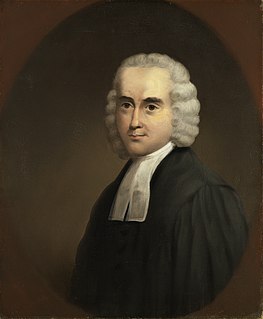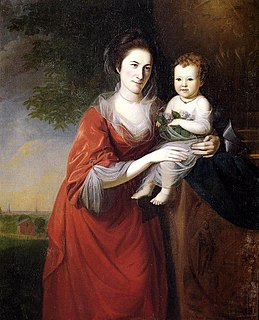See also
| This disambiguation page lists articles about people with the same name. If an internal link led you here, you may wish to change the link to point directly to the intended article. |
Jonathan Dickinson was a Quaker merchant, author and mayor of Philadelphia.
Jonathan Dickinson may also refer to:
| This disambiguation page lists articles about people with the same name. If an internal link led you here, you may wish to change the link to point directly to the intended article. |

Joseph Hewes was a native of Princeton, New Jersey, where he was born in 1730. Hewes's parents were members of the Society of Friends, commonly known as Quakers. On his mother's side, Joseph Hewes was a 3rd generation resident of New Jersey. He was the 4th generation of the Hewes family to live in New Jersey. Hewes attended Princeton but there is no evidence that he actually graduated. What is known is that he became an apprentice of a merchant and in fact became a very successful merchant. After finishing his apprenticeship he earned himself a good name and a strong reputation, which would serve him well in becoming one of the most famous signers of the Declaration of Independence for North Carolina, along with William Hooper and John Penn. Hewes moved to Edenton, North Carolina at the age of 30 and won over the people of the colony with his charm and honorable businesslike character. Hewes was elected to the North Carolina legislature in 1763, only three years after he moved to the colony. After being re-elected numerous times in the legislature, Hewes was now focused on a new and more ambitious job as a continental congressman.
Dickinson may refer to:

Fairleigh Dickinson University is a private university with its main campuses in the U.S. state of New Jersey. Founded in 1942, Fairleigh Dickinson University currently offers more than 100 individual degree programs to its students. In addition to its two campuses in New Jersey, the university also has a campus in Canada, a campus in the United Kingdom, and an online platform. Fairleigh Dickinson University is New Jersey's largest private institution of higher education, with over 11,000 students.

Aaron Burr Sr. was a notable Presbyterian minister and college educator in colonial America. He was a founder of the College of New Jersey and the father of Aaron Burr (1756–1836), the third Vice President of the United States.
Andrew Hamilton was the colonial governor of East and West New Jersey from 1692 to 1697 and again from 1699 to 1703. He also served as Deputy Governor of the neighboring Province of Pennsylvania.

John Dickinson, a Founding Father of the United States, was a solicitor and politician from Philadelphia, Pennsylvania, and Wilmington, Delaware, known as the "Penman of the Revolution" for his twelve Letters from a Farmer in Pennsylvania, published individually in 1767 and 1768. As a member of the First Continental Congress, where he was a signee to the Continental Association, Dickinson drafted most of the 1774 Petition to the King, and then, as a member of the Second Continental Congress, wrote the 1775 Olive Branch Petition. When these two attempts to negotiate with King George III of Great Britain failed, Dickinson reworked Thomas Jefferson's language and wrote the final draft of the 1775 Declaration of the Causes and Necessity of Taking Up Arms. When Congress then decided to seek independence from Great Britain, Dickinson served on the committee that wrote the Model Treaty, and then wrote the first draft of the 1776–1777 Articles of Confederation and Perpetual Union.

Timothy Matlack was a brewer and beer bottler who emerged as a popular and powerful leader in the American Revolutionary War, Secretary of Pennsylvania during the war, and a delegate to the Second Continental Congress in 1780. He became one of Pennsylvania's most provocative and influential political figures, but he was removed from office by his political enemies at the end of the war; however, he returned to power in the Jeffersonian era. Matlack was known for his excellent penmanship and was chosen to inscribe the original United States Declaration of Independence on vellum.

Jonathan Dickinson Sergeant was an American lawyer from Princeton, New Jersey. He represented New Jersey in the Second Continental Congress in 1776 and 1777. He later served as Attorney General for the state of Pennsylvania.
Jonathan Dickinson (1663–1722) was a merchant from Port Royal, Jamaica who was shipwrecked on the southeast coast of Florida in 1696, along with his family and the other passengers and crew members of the ship.

Jonathan Dickinson was a Congregational, later Presbyterian, minister, a leader in the Great Awakening of the 1730s and 1740s, and a co-founder and first president of the College of New Jersey, which later became Princeton University.

William L. Dickinson High School is a four-year comprehensive community public high school located in Jersey City, Hudson County, New Jersey, United States, serving students in ninth through twelfth grades as part of the Jersey City Public Schools. Dickinson occupies a prominent location on Bergen Hill overlooking lower Jersey City and the New York Harbor. The school has been accredited by the Middle States Association of Colleges and Schools Commission on Elementary and Secondary Schools since 1929.

Jonathan Belcher was a merchant, businessman, and politician from the Province of Massachusetts Bay during the American colonial period. Belcher served simultaneously for over a decade as colonial governor of the British colonies of New Hampshire (1729–41) and Massachusetts (1730–41) and later for ten years as governor of New Jersey (1747–57).

Jonathan Dickinson State Park is a Florida State Park and historic site located in Martin County, Florida, between Hobe Sound and Tequesta. The park includes the Elsa Kimbell Environmental Education and Research Center and a variety of natural habitats: sand pine scrub, pine flatwoods, mangroves, and river swamps. The Loxahatchee River, designated a National Wild and Scenic River in 1985, runs through the park. The park is also along the Ocean to Lake Trail. The park is at 16450 S.E. Federal Highway, Hobe Sound. The park is well known for its Camp Murphy Mountain Bike Trails.
European colonization of New Jersey started soon after the 1609 exploration of its coast and bays by Sir Henry Hudson. Dutch and Swedish colonists settled parts of the present-day state as New Netherland and New Sweden. In 1664 the entire area, surrendered to the English, gained its current name. With the Treaty of Westminster in 1674 London formally gained control of the region; it retained that control until the American Revolution.

The Wallace House is a Georgian style historic house, which served as the headquarters of General George Washington during the second Middlebrook encampment (1778–79), located at 38 Washington Place, Somerville, Somerset County, New Jersey, United States. It was added to the National Register of Historic Places on December 2, 1970.

First State National Historical Park is a National Park Service unit which lies primarily in the state of Delaware but which extends partly into Pennsylvania in Chadds Ford. Initially created as First State National Monument by President Barack Obama under the Antiquities Act on March 25, 2013, the park was later redesignated as First State National Historical Park by Congress.

Mary "Polly" Norris Dickinson was an early American land and estate owner and manager. She is known for her ownership of one of the largest libraries in the American colonies, her participation in political thought of the time, and her presence in or near events of the Constitutional Convention, including her marriage to Framer John Dickinson, one of the early drafters of the Constitution and one of its signers on behalf of the colony of Delaware. They bequeathed much of their combined library to the first college founded in the new United States. The college was originally named "John and Mary's College", by Benjamin Rush, for Norris Dickinson and her husband and is now called Dickinson College.
Charles Dickinson FRS was an English gentleman, magistrate, amateur scientist, and literary dilettante.
William Dickinson (1771–1837) was an English politician, in parliament from 1796 to 1831.